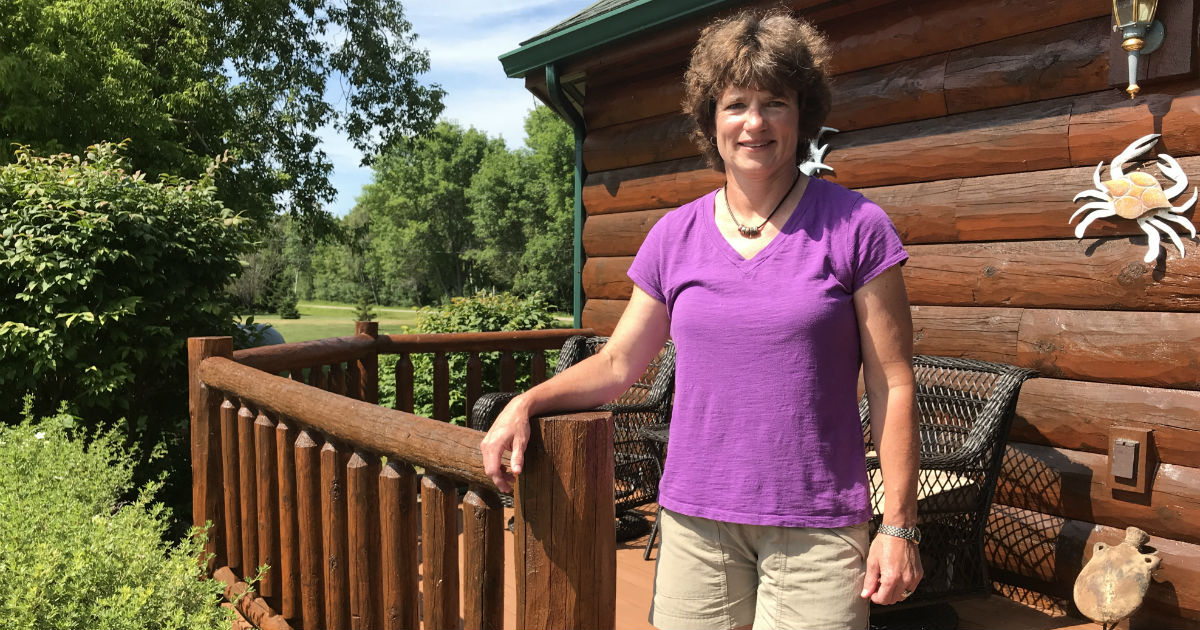When Jean Healy plays sports, she plays at one intensity level. She goes all out all the time. So, when she felt a little soreness behind her knees during a weekend softball tournament, she didn’t think much about it. She just kept playing hard.
“I had never had that before, so I just kept running. I figured, well, it’s gonna stretch out, it’ll warm up, stretch out and be fine,” Jean says.
Originally from Michigan’s Upper Peninsula, Jean returned to the U.P. from Florida in 2018. She had lived there with her husband for more than 20 years. Upon the couple’s return to the U.P., Jean immediately resumed one of her favorite pastimes – softball. She’d been playing since second or third grade, she says.
She hadn’t played in a while, so when her leg woes intensified during the fifth game of the weekend softball tournament, Jean says she decided to play through the soreness.
“Almost the last inning of the game, I was running in the outfield after a ball and something just snapped or popped,” she says. It was her right leg.
“It felt almost like a hyperextension of the knee and I went down immediately and that was it,” she says.
“I knew it was bad because I couldn’t get up, couldn’t walk on it.”
Fortunately, she had a routine checkup with her primary care physician already scheduled for the next day.
The doctor recommended physical therapy, icing and ibuprofen. That didn’t help much, Jean says.
She was referred to Dr. Bradley J. Klumb, an orthopedic surgeon with BayCare Clinic in Marinette.
“It wasn’t getting any better. (I) couldn’t walk, (I) couldn’t sleep, (I) couldn’t stand on it because it would keep spasming if (I) left it in a certain position for too long,” she says. “So, I went back and got an MRI … that’s when they found out there was a tear in the hamstring tendon behind the knee.”
Klumb referred Jean to his BayCare Clinic colleague, Dr. Ryan Woods, an expert in regenerative medicine, also known as orthobiologics. The specialty area offers non-surgical treatments that tap into the body’s ability to initiate a healing response to acute and chronic orthopedic conditions.
The regenerative medicine approach sounded convincing, but Jean says she wasn’t immediately sold on the treatment option, instead opting to continue with therapy.
Weeks into therapy and with little progress being made, she decided to give Woods’ regenerative medicine treatment a try.
That treatment, platelet-rich plasma (PRP), uses a patient’s blood platelets to initiate a regenerative, healing, process. During the procedure, blood is drawn and processed to isolate plasma and platelets. Platelets are naturally-rich in proteins that heal the body and control inflammation. The separated platelets are injected into the area of concern.
“I had not heard of that before,” Jean says. “(Dr. Woods) was very thorough in describing the whole process and kind of the science behind it, the research behind it.
“He didn’t push it, it was an option,” she says. “He was great, great bedside manner, very likeable.”
The combination of PRP treatment and physical therapy worked wonders.
“It was remarkable,” she says. “I could straighten it out without it spasming up again. I could walk with it. I can run, I’m doing a little bit of running now, about a mile and a half at a time … it was night and day from where we were before, well worth it.”
In addition to running, she’s playing sports in the yard with nieces and nephews, is looking forward to golfing, kayaking, fishing and more. She’s even made a return to the softball field … sort of.
“I finally, actually went to one of the games to watch it for a little bit,” she says, adding she’s been cleared to play and has no restrictions. She’s just not ready yet. “It’s tough to watch and not be playing but at the same time it’s also good to have two good legs that work, so I’m happy with that.”
For anyone on the fence about PRP and regenerative medicine, Jean says this: “Go for it, do not wait. Thank heavens there’s new medicine … progression’s a good thing.
“I would absolutely recommend it much more than surgery, cortisone, any of that,” she says. “It’s your own body, it’s your own body healing itself so it’s the best way to go, absolutely.”
